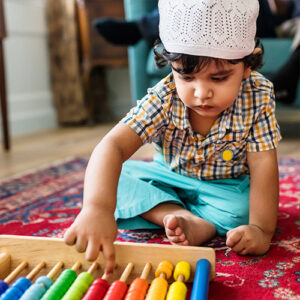Ways to Support Foster Kids During Ramadan
Ramadan is a special time for Muslim children. It is a month of fasting, prayer, and community. If you’re fostering a child who observes Ramadan or wants to learn more about how to support a child who does, you’re in the right place! There are many ways to support foster kids during Ramadan. Understanding the meaning of the holiday and showing support can make a big difference in a child’s experience.
What is Ramadan?
Ramadan is a holy month during the 9th month of the Islamic calendar that lasts for 28-30 days. This year, it will take place on the evening of Friday, February 28th to Saturday, March 29th evening.
The month honors the first revelation of the Qur’an to the Prophet Muhammad. This is believed to be when God began giving him messages that would later become the holy book of Islam.
During Ramadan, Muslim people focus on their faith, practice self-discipline, and help those in need. One of the most important parts of Ramadan is fasting. Muslims do not eat or drink during daylight hours, from sunrise to sunset. They also pray more often and spend time with their community.
Important Dates of Ramadan
Ramadan follows the Islamic lunar calendar, so dates change every year.
Ramadan begins with the sighting of the hilāl (a new crescent moon) and ends after 30 days or when the next crescent moon appears, marking Eid al-Fitr. This holiday (Eid al-Fitr) celebrates the end of fasting with prayers, meals, and acts of charity, such as donating and participating in food drives.
The last ten days of Ramadan are especially important because they include Laylat al-Qadr, or the Night of Power. This night is believed to be when the Qur’an was first revealed. Many Muslims pray extra during this time, hoping for blessings and forgiveness.
Exceptions
Some people are exempt from fasting during Ramadan, including young children, the elderly, those who are ill, pregnant/breastfeeding, menstruating, or travelling.
Young children typically aren’t expected to fast until they reach puberty, but they can join in prayers and acts of giving instead.
How to Support a Foster Child During Ramadan
If you are caring for a child who observes Ramadan, here are some ways to support them:
1. Support Their Fast
Respect their fasting by avoiding tempting meals during daylight hours. You can help by making sure they wake up early for suhoor (the meal before sunrise). In the evening, they will break their fast with iftar, which is often shared with family and friends. You can prepare or buy foods they enjoy for these meals.
2. Provide a Quiet Space for Prayers
Offer prayer mats, a Qu’ran, and enough space for prayer. During Ramadan, prayer is extremely important, and they may pray up to 5 times a day or more. You can also help facilitate travel to mosques if they want to join in prayer there.
3. Be Mindful of Their Energy Levels
Fasting can be tiring, especially for teens and children. Try to be understanding and allow them to take breaks when needed. Avoid scheduling intense physical activities during fasting hours.
4. Plan Meals Strategically
For suhoor and iftar, plan balanced meals with high-protein and high-fiber options that will help keep them full and energized throughout the day. Since they will go hours without eating or drinking, focus on low-sodium, high-water foods to maintain hydration like cucumber and watermelon.
Click here to read the British Nutrition Foundation’s recommendations for healthy Ramadan meals.
5. Volunteer and Give Back Together
Ramadan is a time for kindness and generosity. Join your foster child in giving back by volunteering at a food bank, donating to those in need, or helping with a community meal. Completing a Foster Love team build is an easy way to give back to the community. So is volunteering with Foster Love!
6. Prepare Special Foods for Eid (breaking fast)
To make the celebration even more meaningful, help prepare traditional Eid dishes that your foster child enjoys. Eid al-Fitr is a time for feasting, so consider making sweet treats like baklava, or cooking meals their family makes every year.
7. Most of All, Be Open and Patient
Support your foster child by listening to their needs and respecting their choices. Whether they choose to fully observe Ramadan or not, reassure them that their feelings are valid. Create a safe space where they feel comfortable expressing their beliefs, and never force practices they are not ready for. Your patience and understanding will mean the world to them.
 The Power of Community in Foster Care
The Power of Community in Foster Care
Ramadan is more than fasting, it is about community. Ramadan teaches us the importance of coming together and helping each other. This idea is also important to the foster care community. Children in foster care need support from those around them. When a foster child sees their caregivers and community respect and celebrate their heritage and traditions, it helps them feel safe and valued.
By supporting a foster child during Ramadan, you are showing them kindness, respect, and care. These small actions can help bring them a sense of belonging and love.




 The Power of Community in Foster Care
The Power of Community in Foster Care